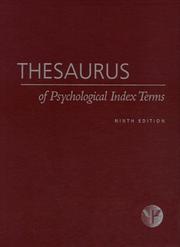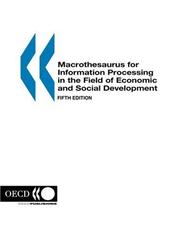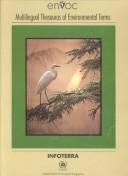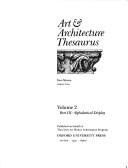| Listing 1 - 10 of 23 | << page >> |
Sort by
|
Book
ISBN: 0660573113 9780660573113 Year: 1992 Publisher: Ottawa National Library of Canada
Abstract | Keywords | Export | Availability | Bookmark
 Loading...
Loading...Choose an application
- Reference Manager
- EndNote
- RefWorks (Direct export to RefWorks)
Subject headings, English --- Vedettes-matière anglaises --- Canada --- Subject headings --- -Controlled vocabularies (Subject headings) --- Headings, Subject --- Indexing vocabularies --- Lists of subject headings --- Structured vocabularies (Subject headings) --- Subject authorities (Information retrieval) --- Subject authority files (Information retrieval) --- Subject authority records (Information retrieval) --- Subject heading lists --- Vocabularies, Controlled (Subject headings) --- Vocabularies, Structured (Subject headings) --- Thesauri (Controlled vocabularies) --- Authority files (Information retrieval) --- Subject cataloging --- FRSAD (Conceptual model) --- -Canada --- Vedettes-matière anglaises --- Canada. --- Subject headings - Canada

ISBN: 1557987750 Year: 2001 Publisher: Washington (D.C.): American psychological association
Abstract | Keywords | Export | Availability | Bookmark
 Loading...
Loading...Choose an application
- Reference Manager
- EndNote
- RefWorks (Direct export to RefWorks)
Subject headings --- Psychology --- Vedettes-matière --- Psychologie --- Psychology. --- Terminology --- Terminologie --- -#PBIB:2001.3 --- Controlled vocabularies (Subject headings) --- Headings, Subject --- Indexing vocabularies --- Lists of subject headings --- Structured vocabularies (Subject headings) --- Subject authorities (Information retrieval) --- Subject authority files (Information retrieval) --- Subject authority records (Information retrieval) --- Subject heading lists --- Subject headings, English --- Vocabularies, Controlled (Subject headings) --- Vocabularies, Structured (Subject headings) --- Thesauri (Controlled vocabularies) --- Authority files (Information retrieval) --- Subject cataloging --- FRSAD (Conceptual model) --- Vedettes-matière --- #PBIB:2001.3

ISBN: 1280030186 9786610030187 9264162992 9264160256 Year: 1998 Publisher: Paris : OECD Publishing,
Abstract | Keywords | Export | Availability | Bookmark
 Loading...
Loading...Choose an application
- Reference Manager
- EndNote
- RefWorks (Direct export to RefWorks)
This new edition of the Macrothesaurus for Information Processing in the field of Economic and Social Development represents a continuation of the combined efforts of many organisations over a period of almost 30 years to create a common vocabulary to facilitate the indexing, retrieval and exchange of development-related information. The Macrothesaurus comprises descriptors (keywords) designed for indexing books and documents covering the field of economic and social development. It can also be used as a search aid for documentation centres, libraries, databases and on-line networks. Efforts have been made to improve the user-friendliness and flexibility of the Macrothesaurus by increasing the number of non-descriptors (i.e. cross-references) and scope notes in this edition. The preparation of this fifth edition was guided by an Advisory Committee composed of representatives from the International Development Research Centre, Ottawa, the United Nations Department of Economic and Social Affairs, New York, the Organisation for Economic Co-operation and Development (OECD), and the OECD Development Centre, Paris.
Development --- Subject headings --- Social Sciences --- Library & Information Science --- Economic development --- Social planning --- Controlled vocabularies (Subject headings) --- Headings, Subject --- Indexing vocabularies --- Lists of subject headings --- Structured vocabularies (Subject headings) --- Subject authorities (Information retrieval) --- Subject authority files (Information retrieval) --- Subject authority records (Information retrieval) --- Subject heading lists --- Subject headings, English --- Vocabularies, Controlled (Subject headings) --- Vocabularies, Structured (Subject headings) --- Thesauri (Controlled vocabularies) --- Authority files (Information retrieval) --- Subject cataloging --- FRSAD (Conceptual model)
Book
ISBN: 0851421970 Year: 1977 Publisher: London ASLIB (Association of special libraries and information bureaux)
Abstract | Keywords | Export | Availability | Bookmark
 Loading...
Loading...Choose an application
- Reference Manager
- EndNote
- RefWorks (Direct export to RefWorks)
Subject headings --- Controlled vocabularies (Subject headings) --- Headings, Subject --- Indexing vocabularies --- Lists of subject headings --- Structured vocabularies (Subject headings) --- Subject authorities (Information retrieval) --- Subject authority files (Information retrieval) --- Subject authority records (Information retrieval) --- Subject heading lists --- Subject headings, English --- Vocabularies, Controlled (Subject headings) --- Vocabularies, Structured (Subject headings) --- Thesauri (Controlled vocabularies) --- Authority files (Information retrieval) --- Subject cataloging --- FRSAD (Conceptual model) --- Thesauri --- Thésaurus --- Thesaurusbouw --- Thesaurusbouw. --- Vedettes-matière --- Thésaurus --- Subject indexing --- THESAURUS --- METHODOLOGIE

ISBN: 9280712608 Year: 1997 Publisher: Nairobi United Nations environment programme
Abstract | Keywords | Export | Availability | Bookmark
 Loading...
Loading...Choose an application
- Reference Manager
- EndNote
- RefWorks (Direct export to RefWorks)
504 <031> --- Subject headings --- -Controlled vocabularies (Subject headings) --- Headings, Subject --- Indexing vocabularies --- Lists of subject headings --- Structured vocabularies (Subject headings) --- Subject authorities (Information retrieval) --- Subject authority files (Information retrieval) --- Subject authority records (Information retrieval) --- Subject heading lists --- Subject headings, English --- Vocabularies, Controlled (Subject headings) --- Vocabularies, Structured (Subject headings) --- Thesauri (Controlled vocabularies) --- Authority files (Information retrieval) --- Subject cataloging --- FRSAD (Conceptual model) --- 504 <031> Environment. Environmental science--Encyclopedieën. Lexica --- Environment. Environmental science--Encyclopedieën. Lexica --- Environmental sciences --- Environmental sciences. --- -Environmental sciences
Book
ISBN: 2760537463 2760537447 9782760537446 9782760537460 9782760537453 2760537455 Year: 2013 Publisher: Québec : Presses de l'Université du Québec,
Abstract | Keywords | Export | Availability | Bookmark
 Loading...
Loading...Choose an application
- Reference Manager
- EndNote
- RefWorks (Direct export to RefWorks)
Ce manuel, le seul en langue française à proposer une approche de nature pratique plutôt que théorique sur le sujet, présente une introduction à l?analyse et à la représentation documentaires. Réalisé à l?intention des futurs spécialistes de l?analyse et de la représentation de l?information et des documents, en formation dans les programmes d?études collégiales et universitaires, il est axé sur les opérations Ưd?analyse, les langages utilisés pour représenter les sujets, les politiques et les normes, le contrôle de qualité et leurs incidences sur la recherche d?information et de documents. On y évoque d?abord les besoins et les comportements des usagers des systèmes d?information contemporains. Sont décrites ensuite les opérations d?indexation, de classification et de rédaction de résumés qui facilitent le repérage et l?accès aux documents pertinents aux besoins de l?usager. Pour chaque sujet traité, l?ouvrage mentionne les objectifs à atteindre, la séquence des opérations à réaliser ainsi que les outils à développer, à tenir à jour et à utiliser. Afin de favoriser la compréhension des étudiants, il contient un glossaire des termes spécialisés et un index des sujets traités. De nombreux tableaux, figures et exemples qui pourront servir de base de discussion et d?apprentissage sont également inclus.
Subject headings. --- Cataloging. --- Controlled vocabularies (Subject headings) --- Headings, Subject --- Indexing vocabularies --- Lists of subject headings --- Structured vocabularies (Subject headings) --- Subject authorities (Information retrieval) --- Subject authority files (Information retrieval) --- Subject authority records (Information retrieval) --- Subject heading lists --- Subject headings, English --- Vocabularies, Controlled (Subject headings) --- Vocabularies, Structured (Subject headings) --- Thesauri (Controlled vocabularies) --- Authority files (Information retrieval) --- Subject cataloging --- FRSAD (Conceptual model) --- Cataloguing --- Information organization --- Technical services (Libraries) --- Books --- Indexing --- Abstracting --- Indexation (Documentation) --- Analyse documentaire --- Résumés analytiques
Book
ISBN: 0901223689 Year: 1975 Publisher: Stevenage Peregrinus
Abstract | Keywords | Export | Availability | Bookmark
 Loading...
Loading...Choose an application
- Reference Manager
- EndNote
- RefWorks (Direct export to RefWorks)
Linguistics --- Subject indexing --- Indexing --- Subject headings --- Classification --- Indexation (Documentation) --- Vedettes-matière --- Books --- Livres --- -Indexing --- Controlled vocabularies (Subject headings) --- Headings, Subject --- Indexing vocabularies --- Lists of subject headings --- Structured vocabularies (Subject headings) --- Subject authorities (Information retrieval) --- Subject authority files (Information retrieval) --- Subject authority records (Information retrieval) --- Subject heading lists --- Subject headings, English --- Vocabularies, Controlled (Subject headings) --- Vocabularies, Structured (Subject headings) --- Thesauri (Controlled vocabularies) --- Authority files (Information retrieval) --- Subject cataloging --- FRSAD (Conceptual model) --- Index preparation --- Preparation of indexes --- Subject analysis --- Information organization --- Filing systems --- Knowledge, Classification of --- Vedettes-matière --- Classification of books --- Libraries --- Library classification of books

ISBN: 0195064038 Year: 1990 Volume: Volume 3 Publisher: New York Oxford University Press
Abstract | Keywords | Export | Availability | Bookmark
 Loading...
Loading...Choose an application
- Reference Manager
- EndNote
- RefWorks (Direct export to RefWorks)
Art --- Subject indexing --- Architecture --- Subject headings --- Vedettes-matière --- Abstracting and indexing --- Analyse et indexation des documents --- -Subject headings --- -Controlled vocabularies (Subject headings) --- Headings, Subject --- Indexing vocabularies --- Lists of subject headings --- Structured vocabularies (Subject headings) --- Subject authorities (Information retrieval) --- Subject authority files (Information retrieval) --- Subject authority records (Information retrieval) --- Subject heading lists --- Subject headings, English --- Vocabularies, Controlled (Subject headings) --- Vocabularies, Structured (Subject headings) --- Thesauri (Controlled vocabularies) --- Authority files (Information retrieval) --- Subject cataloging --- FRSAD (Conceptual model) --- -Architecture --- Vedettes-matière --- Controlled vocabularies (Subject headings) --- Subject headings - Art. --- Art - Abstracting and indexing. --- Subject headings - Architecture. --- Architecture - Abstracting and indexing. --- Architecture. --- Art.
Book
ISBN: 9220038501 Year: 1985
Abstract | Keywords | Export | Availability | Bookmark
 Loading...
Loading...Choose an application
- Reference Manager
- EndNote
- RefWorks (Direct export to RefWorks)
Computer programs --- Information storage and retrieval systems --- Labor economics --- Systèmes d'information --- Terminology. --- International Labour Office. --- Computer programs. --- Labor --- -Subject headings --- -Trefwoordencatalogi 018 --- 351.83/.84 --- Controlled vocabularies (Subject headings) --- Headings, Subject --- Indexing vocabularies --- Lists of subject headings --- Structured vocabularies (Subject headings) --- Subject authorities (Information retrieval) --- Subject authority files (Information retrieval) --- Subject authority records (Information retrieval) --- Subject heading lists --- Subject headings, English --- Vocabularies, Controlled (Subject headings) --- Vocabularies, Structured (Subject headings) --- Thesauri (Controlled vocabularies) --- Authority files (Information retrieval) --- Subject cataloging --- FRSAD (Conceptual model) --- Labor and laboring classes --- Manpower --- Work --- Working class --- Abstracting and indexing --- Sociaal recht --- 351.83/.84 Sociaal recht --- Systèmes d'information

ISBN: 185604565X 9781856045650 9781856049849 1306342287 1856049841 Year: 2006 Publisher: London : Facet,
Abstract | Keywords | Export | Availability | Bookmark
 Loading...
Loading...Choose an application
- Reference Manager
- EndNote
- RefWorks (Direct export to RefWorks)
Many information professionals working in small units today fail to find the published tools for subject-based organization that are appropriate to their local needs, whether they are archivists, special librarians, information officers, or knowledge or content managers. Large established standards for document description and organization are too unwieldy, unnecessarily detailed, or too expensive to install and maintain. In other cases the available systems are insufficient for a specialist environment, or don't bring things together in a helpful way. A purpose built, in-house system would seem to be the answer, but too often the skills necessary to create one are lacking. This practical text examines the criteria relevant to the selection of a subject-management system, describes the characteristics of some common types of subject tool, and takes the novice step by step through the process of creating a system for a specialist environment. The methodology employed is a standard technique for the building of a thesaurus that incidentally creates a compatible classification or taxonomy, both of which may be used in a variety of ways for document or information management. Key areas covered are: What is a thesaurus? Tools for subject access and retrieval; what a thesaurus is used for? Why use a thesaurus? Examples of thesauri; the structure of a thesaurus; thesaural relationships; practical thesaurus construction; the vocabulary of the thesaurus; building the systematic structure; conversion to alphabetic format; forms of entry in the thesaurus; maintaining the thesaurus; thesaurus software; and; the wider environment. Essential for the practising information professional, this guide is also valuable for students of library and information science.
Subject cataloging. --- Thesauri --- Analyse documentaire --- Thésaurus --- Subject headings. --- Subject tools. --- Subject headings --- Subject cataloging --- Social Sciences --- Library & Information Science --- tesaurusbygging --- tesauruskonstruksjon --- tesaurus --- klassifikasjon --- kunnskapsorganisering --- emnekatalogisering --- indeksering --- terminologi --- lærebøker --- kunnskapsorganisasjon --- 025.47 --- Encyclopedias and dictionaries --- Subject analysis --- Cataloging --- Content analysis (Communication) --- Indexing --- Controlled vocabularies (Subject headings) --- Headings, Subject --- Indexing vocabularies --- Lists of subject headings --- Structured vocabularies (Subject headings) --- Subject authorities (Information retrieval) --- Subject authority files (Information retrieval) --- Subject authority records (Information retrieval) --- Subject heading lists --- Subject headings, English --- Vocabularies, Controlled (Subject headings) --- Vocabularies, Structured (Subject headings) --- Thesauri (Controlled vocabularies) --- Authority files (Information retrieval) --- FRSAD (Conceptual model) --- Thésaurus
| Listing 1 - 10 of 23 | << page >> |
Sort by
|

 Search
Search Feedback
Feedback About
About Help
Help News
News